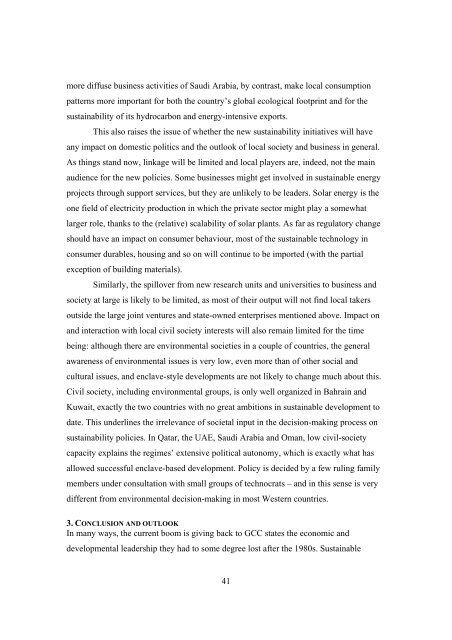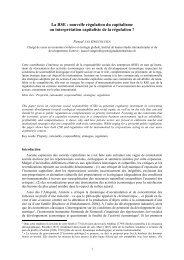PDF - Graduate Institute of International and Development Studies
PDF - Graduate Institute of International and Development Studies
PDF - Graduate Institute of International and Development Studies
Create successful ePaper yourself
Turn your PDF publications into a flip-book with our unique Google optimized e-Paper software.
more diffuse business activities <strong>of</strong> Saudi Arabia, by contrast, make local consumption<br />
patterns more important for both the country’s global ecological footprint <strong>and</strong> for the<br />
sustainability <strong>of</strong> its hydrocarbon <strong>and</strong> energy-intensive exports.<br />
This also raises the issue <strong>of</strong> whether the new sustainability initiatives will have<br />
any impact on domestic politics <strong>and</strong> the outlook <strong>of</strong> local society <strong>and</strong> business in general.<br />
As things st<strong>and</strong> now, linkage will be limited <strong>and</strong> local players are, indeed, not the main<br />
audience for the new policies. Some businesses might get involved in sustainable energy<br />
projects through support services, but they are unlikely to be leaders. Solar energy is the<br />
one field <strong>of</strong> electricity production in which the private sector might play a somewhat<br />
larger role, thanks to the (relative) scalability <strong>of</strong> solar plants. As far as regulatory change<br />
should have an impact on consumer behaviour, most <strong>of</strong> the sustainable technology in<br />
consumer durables, housing <strong>and</strong> so on will continue to be imported (with the partial<br />
exception <strong>of</strong> building materials).<br />
Similarly, the spillover from new research units <strong>and</strong> universities to business <strong>and</strong><br />
society at large is likely to be limited, as most <strong>of</strong> their output will not find local takers<br />
outside the large joint ventures <strong>and</strong> state-owned enterprises mentioned above. Impact on<br />
<strong>and</strong> interaction with local civil society interests will also remain limited for the time<br />
being: although there are environmental societies in a couple <strong>of</strong> countries, the general<br />
awareness <strong>of</strong> environmental issues is very low, even more than <strong>of</strong> other social <strong>and</strong><br />
cultural issues, <strong>and</strong> enclave-style developments are not likely to change much about this.<br />
Civil society, including environmental groups, is only well organized in Bahrain <strong>and</strong><br />
Kuwait, exactly the two countries with no great ambitions in sustainable development to<br />
date. This underlines the irrelevance <strong>of</strong> societal input in the decision-making process on<br />
sustainability policies. In Qatar, the UAE, Saudi Arabia <strong>and</strong> Oman, low civil-society<br />
capacity explains the regimes’ extensive political autonomy, which is exactly what has<br />
allowed successful enclave-based development. Policy is decided by a few ruling family<br />
members under consultation with small groups <strong>of</strong> technocrats – <strong>and</strong> in this sense is very<br />
different from environmental decision-making in most Western countries.<br />
3. CONCLUSION AND OUTLOOK<br />
In many ways, the current boom is giving back to GCC states the economic <strong>and</strong><br />
developmental leadership they had to some degree lost after the 1980s. Sustainable<br />
41




